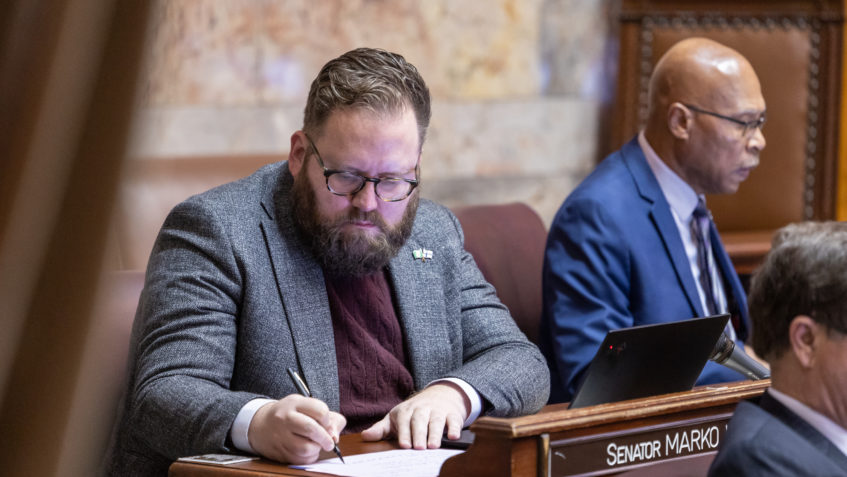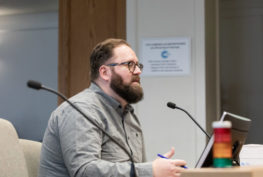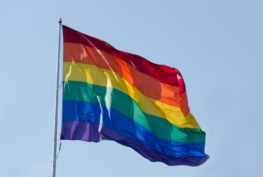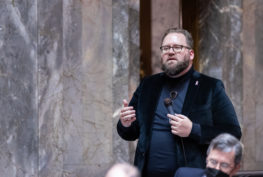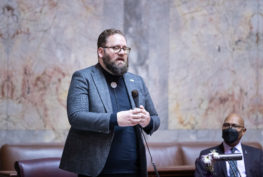The Senate on Wednesday announced details of the 2023-25 transportation budget, a plan totaling $12.9 billion in investments across the state. The proposal focuses on traffic safety, workforce expansion in the state patrol and ferry system, electrification, transit and other green investments and keeps work on schedule for transportation projects big and small throughout Washington.
A second supplemental transportation budget for the 2021-23 biennium totaling $10.6 billion was also introduced Wednesday.
“It was important in this budget that we continued the essential work we started by passing the Move Ahead Washington plan last year, and I feel that we’ve done that,” Transportation Committee Chair Sen. Marko Liias (D-Everett) said. “You can’t just reimagine the way transportation is funded once. We follow those same values in this budget, investing heavily in projects that will further position our state as a leader in green jobs and innovation, while keeping our promise to complete critical projects on time across Washington. We can do both.”
Safety is at the center of every transportation decision, and this budget doubles down on that promise. With traffic fatalities at a 30-year high, a renewed emphasis on safety was a goal of the 2023 legislative session. Safety investments in this budget include safe routes to school, grade separation to prevent rural road lane departures — which frequently result in serious injury or death — directing the Traffic Safety Commission to study and respond to alarming safety trends, mapping out sidewalk gaps, improving busy intersections, and addressing the section of Pacific Avenue at 134th St. in Parkland that led to the death of 13-year-old Michael Weilert, who was struck and killed while riding his bike at a crosswalk at that intersection in July 2022.
“Traffic safety deaths are even more tragic because they are preventable,” Liias said. “It is unacceptable for our state to continue to see an increase in this trend, and my hope and belief is that with the steps we’re taking in this budget, and with the policies we’re working on this year, we can begin to make our roads safer for bicyclists, pedestrians and motorists.”
The Senate’s safety agenda also includes investments to address the workforce shortage at the Washington State Patrol. Steps are being taken to offer bonuses, recruit already experienced officers to the force through the WSP lateral academy, and diversify the WSP through renewed efforts to recruit and retain women and people of color.
“I spent more than three decades as a trooper in the Washington State Patrol and can confidently say our roads are more dangerous than they have ever been,” said Sen. John Lovick (D-Mill Creek), co-vice chair of the Transportation Committee. “Last year was the single most fatal year in history for travelers on Washington’s roads and part of the complex issue we face is a shortage in peace officers. This year, we met the challenge head-on with a multipronged bipartisan effort to bump up the number of police training academies, diversify the force with an influx of female officers, fine tune our vehicular pursuits policy and more. This was a big year for traffic and community safety and an important step in the right direction.”
A new funding source this year for transportation comes from Climate Commitment Act auctions. Approximately $830 million in investments in green projects are made in this budget — $758 million of which comes from CCA auctions. Those projects include increasing safe routes to schools, e-bike and school-based bike programs, ferry electrification and ultra-high-speed rail.
“We’re building on the investments we made last year so Washington can have the cleanest, greenest, healthiest transportation system possible,” said Sen. Sharon Shewmake (D-Bellingham), co-vice chair of the Transportation Committee. “By supporting electric vehicles, e-bikes, and all kinds of bicycle, pedestrian, and transit infrastructure, we can help people get where they need to go and protect our climate at the same time. Every time some someone picks a bike, a bus ride or a walk instead of a car, that means one fewer car on the road, and they get a little bit of exercise too. This will be the best transportation budget yet for our health and the environment.”
This budget also ensures large transportation projects already underway continue to progress — projects like the North Spokane Corridor, Highway 18, and Puget Sound Gateway, a critical connection that completes two critical missing links in Washington state’s highway and freight network. Similarly, this budget continues our state’s commitment to put $1 billion toward replacing the Interstate 5 bridge over the Columbia River.
A focus on Washington’s ferry system is at the core of this budget as well. That includes procurement of new ferries — including hybrid-electric vessels — in a timely manner, as well as addressing workforce shortages by empowering more diverse communities to seek out those careers.
Also introduced was a bill to expand the bonding authority of Connecting Washington, the statewide transportation investment plan passed in 2015. The additional bonding authority will provide a path to complete at least 90% of the Connecting Washington projects on the original 16-year timeline.
The transportation budget is scheduled to be heard in the Transportation Committee 12:30 p.m. Thursday, March 30.
View the full proposal here.

